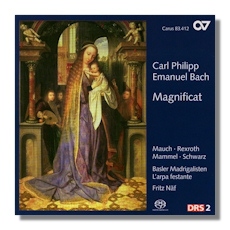
The Internet's Premier Classical Music Source
Related Links
- C.P.E. Bach Reviews
- Latest Reviews
- More Reviews
-
By Composer
-
Collections
DVD & Blu-ray
Books
Concert Reviews
Articles/Interviews
Software
Audio
Search Amazon
Recommended Links
Site News
 SACD Review
SACD Review
Carl Philipp Emanuel Bach

- Magnificat
- Die Himmel erzählen die Ehre Gottes
Monika Mauch, soprano
Matthias Rexroth, alto
Hans Jörg Mammel, tenor
Gotthold Schwarz, bass
Basler Madrigalisten
L'arpa festant/Fritz Näf
Carus 83.412 Hybrid Multichannel SACD 62:37
These are the first recordings of the original versions of both the Magnificat (from 1749) and the Christmas cantata, Die Himmel erzählen die Ehre Gottes (The Heavens are Telling, probably 1773) by Carl Philipp Emanuel Bach. Quite without spectacle or effect, these performances recommend themselves from first note to last. The singing is pointed, meticulously articulated, clean and full of pathos, poignancy, celebration and awe as needed. The instrumental forces are equally sharp and pleasing. The strings in particular of L'arpa festante sound both at home and fully relaxed. At the same time they retain all of the music's bite: listen to the attack and sustained lines in the "Quia fecit" [tr.11], for instance.
C.P.E. Bach's are very different interpretations and settings of the texts from those of his father. More like Haydn or even Mozart (in the "Misericordia" [tr.12], for example) they have a profundity and assurance which the performers here bring out to the full. Not that anything is lacking in the way of musical drama or weight. The opening of the "Fecit potentiam" [tr.13], for example – played with gravitas and urgency in equal measure – suggests a greater and more severe respect towards the wrathful protagonist than Handel would have dealt his listeners. But with a springier rhythm and words stretched over multiple notes, it contrasts with heavenly smiting as J.S. Bach would have conceived it. The performers, whose pace is fast, unlingering and disciplined, are still full of menace and drama without being unnecessarily impressionistic; they use the notes, not effects to suggest the import of the words.
The way in which Näf elicits passion and immediacy in a movement like the "Deposuit" [tr.14] is just as typical: feeling is increased, enhanced and highlighted by the sense of control and hence immediacy and presence, rather than swellings and rubato. Truly a Bachian approach! Matthias Rexroth and Hans Jörg Mammel are particularly impressive here: precise, clean, close and full of color without being either too forward or distractingly choppy. Similarly Rexroth in the "Suscepit Israel" [tr.15]: there is room for reflection and consideration as well as for showing tenderness, as the text requires. Yet his singing draws us into the meaning, rather than interprets it for us. Quite an achievement.
The level of warmth admixed with precision in numbers like this is not atypical of the whole; it pervades all the music on this well-produced CD. These levels of insight are common to the way both works unfold. Indeed there is a sense of architecture, of structure, which these forces bring out very well. Not only the soloists and orchestra but also the chorus – at its best in the upbeat "Gloria patri" [tr.16], for example. Their approach to the fugal scoring (the grandeur and magnificence of the concluding "Sicut erat" [17], for example) is convincing, exhilarating and very persuasive. As with the other movements, this is performed fully in accord with exactly what the idiom of C.P.E. Bach, developing between the Baroque and early Classical, demands.
The Christmas cantata was altered by C.P.E. Bach, we think, in order to reflect and then work independently of clerical appointments made in Hamburg in 1772. In the form heard here it surpasses any local significance, now essentially lost, and stands in its own right as a vibrant and sensitive hymn of praise. And that's how the soloists (weighted towards the men) and chorus have conceived it. Again, it's full of passion and awe. And the way in which C.P.E. Bach conveys those by relying not on drama or climax but on sober and reasoned setting of the text – albeit more holistically than did his father – is respected by Fritz Näf, the Basler Madrigalisten, L'arpa festant and – again – the accomplished and committed soloists.
So this recording in many ways reflects the high esteem in which the composer held his Magnificat, continuing to improve on it until a few years before his death. The booklet contains all the texts, the acoustic is ample, open and rich. The performers have their souls as well as their backs in every nuance and syllable. Even if these were not world première recordings, the precision, expression, sense of movement and of occasion communicated by all concerned would make then highly recommendable.
Copyright © 2009, Mark Sealey




















